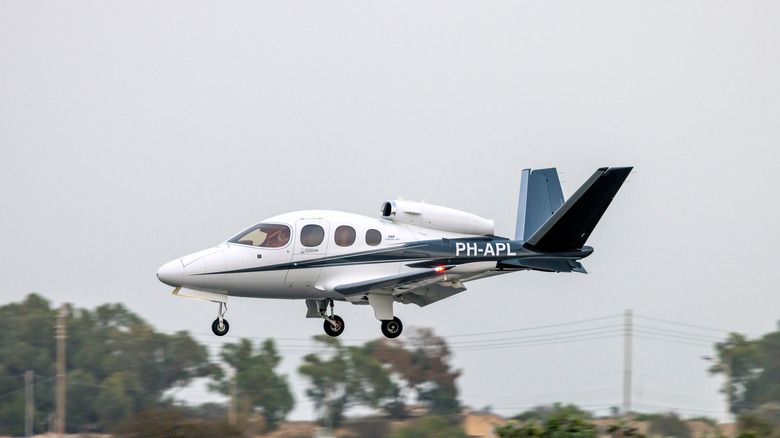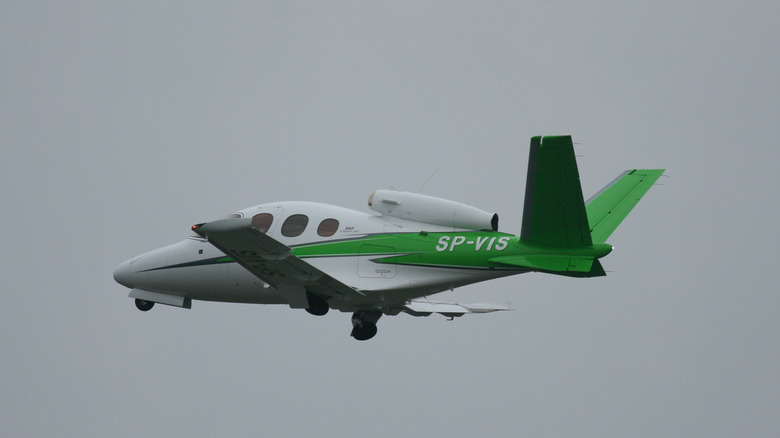This Private Jet Airline Just Went Bankrupt And The Reason Couldn't Be Clearer
The aviation company Verijet was once among the top 20 private jet operators in the country. Now, after wracking up tens of millions of dollars in debt and the death of its founder, it's filed for bankruptcy.
Verijet filed a Chapter 7 petition in the United States Bankruptcy Court for the Southern District of Florida on October 9, 2025. Just a few weeks prior, Verijet's founder and CEO Richard Kane died of a heart attack at the age of 60 while riding his bicycle, the Private Jet Card Comparisons newsletter reported. Even a week after the filing, Kane's death was still not mentioned on Verijet's website.
Unlike Chapter 11, where companies sometimes come roaring back from bankruptcy after reorganizing their assets, a Chapter 7 filing means a business entity's days are numbered as its assets are liquidated and distributed to pay off debt. And in this case, there is a lot of debt to address. Per Verijet's Chapter 7 bankruptcy filing, the company has more than $38.65 million in liabilities and just slightly over $2.53 million in assets. Most of that is from an insurance claim against plane manufacturer Cirrus Design Corporation — though there is also $200 in furniture stashed in a public storage facility in Sanford, Florida. Nine bank accounts were listed, each with $0 in cash. A life insurance claim on Richard Kane was also listed as an asset, though its value is unknown.
Verijet was flying high fairly soon after it was founded
It costs a lot of money to buy a private jet, and with fuel costs, salaries, and other fees, simply landing a private jet can come with a hefty price as well. Chartering jets isn't cheap either, as rental rates can easily reach $10,000 an hour. Kane had a dream of making private air travel more widely accessible by assembling an armada of single-engine Cirrus SF50 "Vision" Jets capable of holding seven people at rates as low as $2,500 per hour. According to the Global Business & Economics Journal (GBEJ), that's about 40% lower than what competitors charged for flying similarly small aircraft.
And Kane's new business started great. In 2022, just two years after its founding, Verijet was the 30th largest private jet provider in terms of flight hours, per Private Card Comparisons. By the end of 2023, it was ranked No. 13. Verijet grew its fleet to around 20 leased Cirrus SF50 Jets, and it expanded its service area beyond the Southeastern U.S. and into the West Coast, Texas, and the Northeast.
Verijet's expansion was fueled by the sale of non-refundable jet cards that locked in pricing for customers, but didn't guarantee them flights. That led to a slew of lawsuits from customers who complained their cards were worthless because their flights were constantly canceled. That may have been because a chunk of Verijet's fleets were grounded in October 2023, when Kane briefly left his position as CEO.
The lawsuits kept coming, and Verijet ultimately crash landed
Less than a month later, Kane was back. He claimed he'd secured an $85 million investment from a Delaware-based company called Solaino, and made it seem like more cash was coming. When he returned as CEO in November 2023, Kane told Private Jet Card Comparisons that seven of Verijet's aircraft were still in the air and that another 14 would be online before the end of that year. But by September 2025, Verijet had just three leased aircraft registered with the FAA, only one of which had flown in the previous three months.
Meanwhile, lawsuits kept piling up from customers, former employees, aircraft leasing companies, and at least one investor, to which Verijet often didn't even bother responding. The largest of those issued judgments is a $3.4 million judgment owed to an affiliate of Washington, D.C.-based aircraft lessor Vision Leasing for unpaid rent and damages, per the South Florida Business Journal. Verijet was also hit with a default judgment of more than $328,000 from a jet card holder who claimed he'd been unable to use the nearly 120 hours of flight time he purchased due to frequent cancellations, per Private Jet Card Comparisons.
Those judgments are now listed among Verijet's listed liabilities, as are 81 jet card customers with a total unused balance of $10.5 million, Private Jet Card Comparisons calculated. Of those 81 cards, the average unpaid balance was $129,697 while the largest was $728,000.


